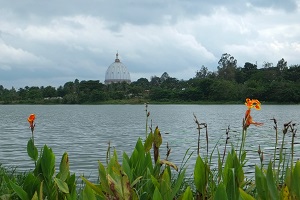The Niger River Basin, shared by Benin,
Burkina Faso, Cameroon, Côte 
d’Ivoire, Guinea, Mali, Niger,Nigeria and Chad, is the second largest river Basin in West Africa
and home to 140 million people. With increasing demands on its water resources, ensuring cooperation for their management is critical for sustainable development, peace and stability.
_x000D_
On 11 April, an information day on the Water Convention resulted in a strong recommendation to the Niger basincountries to join the Convention on the Protection and Use of Transboundary Watercourses and International Lakes (Water Convention), serviced by the United Nations Economic Commission for Europe (UNECE). The day, organized by the Niger Basin Authority (NBA) and the Water Convention secretariat in cooperation with the African Development Bank brought together more than 50 representatives of the Niger basin countries, including heads of state advisors responsible for water and environment, parliamentarians, ambassadors and experts from water ministries.
_x000D_
The NBA Executive Secretary, Mr. Abderahim Bireme Hamid, stated: “today, water resources are the cause of latent or declared conflicts between numerous countries in the world. To defuse the situation in its area, NBA developed a Water Charter in 2008 and had it adopted by Member Countries’ Heads of State and Government in order to regulate the management of Niger River’s water resources and its basin shared by Benin, Burkina Faso, Cameroon, Côte d’Ivoire, Guinea, Mali, Niger, Nigeria and Chad”. He stressed that Water Charter is based mainly on the global conventions and underlined the importance for NBA Member countries to accede the Water Convention to facilitate the implementation of the Water Charter.
_x000D_
In her speech, Ms. Francesca Bernardini, the Secretary to the Water Convention said she was glad that the workshop had been initiated by the Niger Basin Authority. She added that “basin organizations are the Water Convention’s implementing agents. They are the goal and the driving force for an effective implementation of the Convention”.
_x000D_
The Niger Basin Authority was established in 1980, succeeding the Niger River Commission established in 1964, with the goal to promote the integrated management and development of water resources in the Niger River Basin. In 2018, Chad acceded as first Niger basin country and as first African state to the Convention.
_x000D_
The information day was followed on 15 April by a national workshop on the Water Convention for Côte d’Ivoire, attended by more than 60 representatives from different ministries, parliament, river basin authorities, civil society and academia from Côte d’Ivoire.
_x000D_
The Minister of Water and Forests, His Excellency Alain-Richard Donwahi, in his opening speech recalled the objectives of the workshop and announced that the country would develop a new water code, including aspects of transboundary water cooperation, considering that the country shares 7 rivers with its neighbours. Therefore, he considered that the Convention come timely to support Côte d’Ivoire effort’s in strengthening the management of transboundary water resources.
_x000D_
In the opening session, the Ambassador of France, His Excellency Gilles Huberson, the Head of cooperation of the European Union Delegation in Côte d’Ivoire, Mr Michel Laloge and the UNDP Resident Coordinator, Mr Luc Grégoire underlines the usefulness of the Convention as a tool for water diplomacy and national water governance, and offered support for the Convention’s implementation.
_x000D_
Since 2014, Côte d’Ivoire regularly participated in meetings and activities organized under the Water Convention and expressed its interest in acceding to the Water Convention. Through a letter sent in 2018, the Ministry of Water and Forests of Côte d’Ivoire formally expressed the country’s intention to start the accession process and requested support of the secretariat. In this context, the national workshop aimed to discuss the benefits and obligations of Côte d’Ivoire’s accession to the Water Convention. As a result of the workshop, Côte d’Ivoire will continue the accession process. In order to facilitate this, participants encouraged the Ivorian State to continue studying in detail the Convention in order to identify the benefits and challenges related to its implementation.
_x000D_
African Development Bank (AfDB) contribute actively both to the information day for NBA Members States as well to the national workshop for Côte d’Ivoire. During both events, the AfDB representative explained that accession to the Convention can also foster and facilitate investments. In this regard, a seminar was organized at the AfDB Headquarter on 12 April to inform AfDB staff about the Convention and discuss cooperation opportunities.
_x000D_
The Water Convention secretariat has already collaborated with the African Development Bank over the last years, for example in the field of financing climate change adaptation in transboundary basins. In June 2017 in Dakar, UNECE and AFDB in collaboration with other partners jointly conducted a training on “How to prepare bankable projects for financing climate change adaptation in transboundary basins”. This training was followed by a tailored training in November 2018 for experts from Chad and from the riparian countries in the lake Chad and Niger basin as well as the related basin organizations (Lake Chad Basin Commission, Niger Basin Authority).
_x000D_
The meetings on 12 April in Abidjan resulted in additional possible cooperation suggestions, such as joint capacity-building, preparation of joint knowledge products and cooperation in specific projects.
_x000D_
source: www.unece.org


